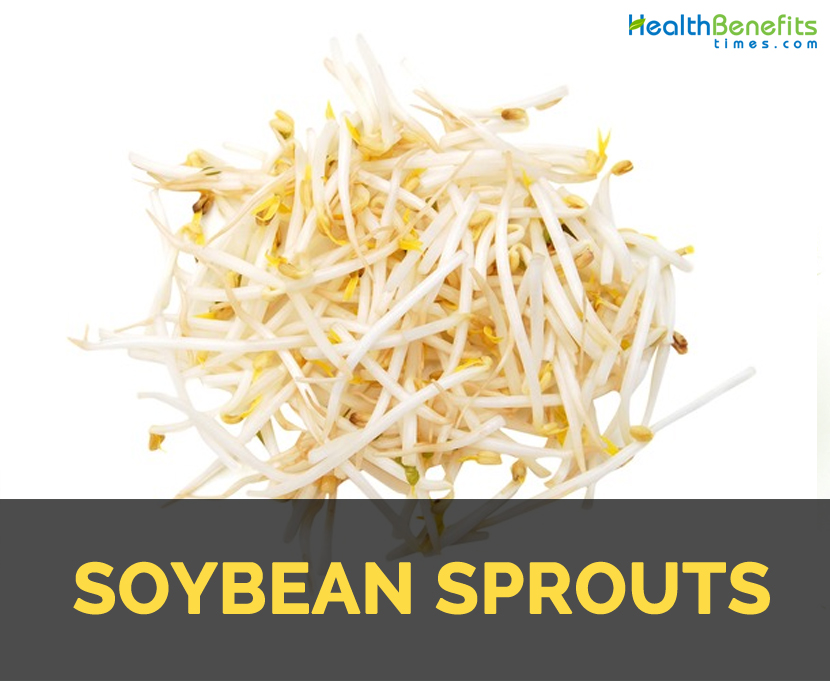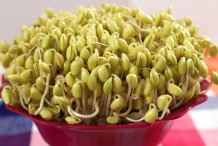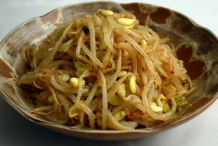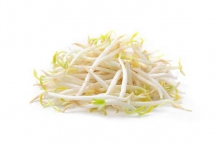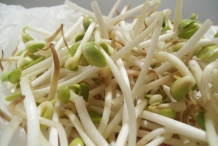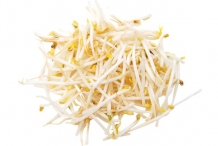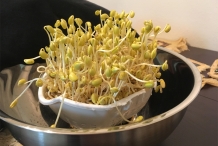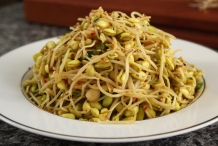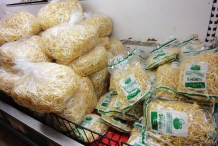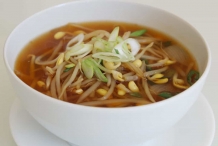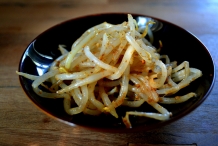Soybeans are crucial part of typical Korean diet due to its oil, protein and other components. Soybean seeds possess average of 20% oil and 40% protein on dry weight basis. Remaining 40% comprises of vitamins, carbohydrates, minerals, phytochemicals and other minor elements. Sprouts are common vegetable for centuries. Soybean sprouts are used in various recipes such as soy sauce, in soup, mixing with rice or as a fresh salad.
An intake of soybean sprouts has increased the demand of soybean varieties which produce high quality sprouts. For producing soybean sprout, high germination percentage, thick hypocotyls, small seed size, rapid water production are essential factors. These sprouts have high content of nutrients and are easy to produce.
Soybean sprouts are used for consumption of human for more than 5000 years. It possess delicate and distinctive flavor and provides various required nutrients.
History
Assumed, Soybean sprouts are consumed since the Three Kingdoms of Korea. In early 13th century medical book, Emergency Folk Medicine Remedies, records of kongnamul cultivation was found which was published in Goryeo. During foundation of Goryeo, Bae Hyeon-gyeong, a Taebong offered Soybean sprouts to starving soldiers.
In Farm Management, Joseon farming & living book, cooking methods of Soybean sprout dishes were listed. Literally Miscellany of Seongho, a Joseon document, stated that soybean sprouts were used by poor to make juk i.e. rice porridge. An essay collection from Joseon era, according to Complete Works of Cheongjanggwan, soybean sprout was regarded as the main food consumed at the time of famine.
Health benefits of Soybean sprouts
Soybean sprouts possess nutritional components such as riboflavin, isoflavones and niacin with amino acids, crude protein and lipids. It has high content of micro and macro elements such as zinc, sodium, potassium, copper, magnesium, phosphorus, iron, manganese and magnesium. The presence of constituents in cotyledons and hypocotyls depends on the variety of soybean. Soybean sprouts helps to lower the chances of cancer, cardiovascular diseases due to the presence of various health promoting phytochemicals having high antioxidant properties. Moreover, anti-nutritional factors such as trypsin inhibitors, hemagglutinin and lipoxygenase reduce during sprouting.
How to store
Put the Soybean sprouts in plastic or zip-lock containers and refrigerate. It should be used within two days.
How to Eat
- Soybean sprouts are an essential ingredient in Korean cuisine.
- Namul is prepared by stir frying soybean sprouts with sesame oil.
- It is also used in bibimbap and jjim dishes such as agwi-jjim.
- Add it to soups and rice and serve it as a side dish.
Precautions
- Sprouts carry bacteria so it should be consumed after properly cooked.
- High amount of soy could mess up leptin sensitivity and also provokes hunger pangs.
- It could cause insulin resistance.
- Due to the high presence of phytates, Soy could prevent the availability of iron, calcium, magnesium and zinc in the body.
- It has trypsin inhibitors which causes problem in pancreas and trick hormones growth.
- Soy products grown are genetically modified which could cause certain cancers, allergies, sterility, birth defects and other problems.
- Phytoestrogens mimic and also block natural estrogen that interrupts hormone balance in the body.
- High intake of soy is associated to infertility, breast cancer and hormone imbalances.
References:
https://en.wikipedia.org/wiki/Soybean_sprout
https://www.culturesforhealth.com/learn/sprouting/how-to-sprout-soy-beans/
https://www.e-sciencecentral.org/upload/pbb/pdf/pbb-04-398.pdf
https://www.culturesforhealth.com/learn/sprouting/raw-sprout-safety-tips/
https://eatlove.live/sprouted-soy-health-risks/
https://www.tarladalal.com/glossary-bean-sprouts-193i
https://www.maangchi.com/ingredient/kongnamool
Comments
| Soybean sprouts Quick Facts | |
|---|---|
| Name: | Soybean sprouts |
| Taste | Sweet and nutty |
| Calories | 76 Kcal./cup |
| Major nutrients | Vitamin K (55.33%) Copper (34.44%) Manganese (29.00%) Tryptophan (22.05%) Isoleucine (21.05%) |
| Name | Soybean sprouts |
|---|---|
| Taste | Sweet and nutty |
| Major Nutritions | Vitamin K (phylloquinone) 66.4 µg (55.33%) Copper, Cu 0.31 mg (34.44%) Manganese, Mn 0.667 mg (29.00%) Tryptophan 0.097 g (22.05%) Isoleucine 0.352 g (21.05%) Vitamin B9 (Folate) 75 µg (18.75%) Phosphorus, P 127 mg (18.14%) Valine 0.377 g (17.85%) Threonine 0.305 g (17.33%) Histidine 0.212 g (17.21%) |
| Calories in 1 cup (94 g) | 76 Kcal. |


